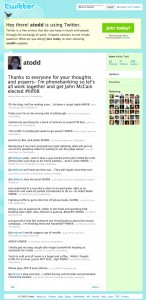Time again for a “Social Media Top 5” roundup of items and issues I found interesting– if you do also, feel free to comment:


The Next Step in the Mainstreamification of Twitter: McCain campaign volunteer Ashley Todd gets creativity points for using Twitter to push her elaborately stupid hoax in which she claimed an African American
Obama supporter robbed her at an ATM and carved a “B” into her cheek. A backwards “B?” The real amusing part is that the Twitter meme “#litf08” – standing for “Life in the Field” and is a tag for McCain supporters to post about their work on the campaign and support for their candidate- has been taken over by people mocking Todd- and, less fairly, the McCain campaign.
A reminder that tools like Twitter are public, and RSS feeds like this one can be manipulated should the mob feel like taking it over with its own content.
Guess what the big Halloween costume among social media addicts will be this year?
- What is Public and What isn’t?
Jason Calacanis, serial entrepreneur currently heading up Mahalo, sent an email to his subscriber list detailing the process he went through in recent layoffs at the company, and remembering when he had to do it at Silicon Alley Reporter during the Dot-Bust days. A great post and very detailed and humanizing, but he pulled a fit when Erick Schonfeld of TechCrunch reprinted the entire email. Alan Hoskins has an account of the exchange here.
So, now we are talking about what’s public and what’s not rather than the economy. Much more interesting to be sure. Was Schonfeld in the clear? Calacanis maintains that his email is a private communication. Schonfeld counters that as Calacanis is a public figure (would a court say that?), and that the email list is a hardly-restricted 9,000 strong, the material is fair game, and besides, it’s a news item, not to mention Calacanis publicly posted a much shorter version of the story on his blog.
So, who’s in the right here? I would love to hear a ruling on this, to establish some precedent.
- Chris Brogan talks in detail about scaling social networks in this detailed post. Can social networks scale? Aren’t these supposed to be personalized interactions, and any group bigger than Dunbar’s Number of 150 is broadcasting? As someone who has gone a bit over the 150 mark on Twitter, I have some perspective- the larger groups do not have be treated as broadcast. I see them as a bunch of little, intersecting Dunbar groups. So how do we scale? We compartmentalize. In the case of Twitter, it’s who is talking now, not who is in your network. In any social engagement, it is who is involved in the conversation, not who is in the room. That’s how social networking scales.
- David Spark writes in Mashable about the Biggest Mistakes Made by Social Media Gurus. some great confessionals and calling-out here; particularly the bit warning against not engaging the self-promoters– aren’t we all doing that (and here is my chance to link to Scott Monty’s “Me” post for the third time in a week)? on the other hand, to accept as a rule not to “accept friend requests from people you barely know” is really not for one person to say, is it? “Barley know” doesn’t even have a single definition. As always, posts like this are good fodder for debate.
- And speaking of rules, Lois Paul, head of the eponymous PR agency (and competitor to my employer, SHIFT Communications), is a blogger I enjoy reading often. I’m conflicted about her post “The Amy Post of Twitterdom” purporting to write some Twitter etiquette rules. I actually agree with a number of them (no need to thank people for following you, but then again it doesn’t bother me), while others I definitely do not (don’t Tweet more than once an hour? Seriously?) but am also tempted to pick a day – soon- where I pointedly violate all of her rules and see what kind of backlash I get- not much, I suspect. The community writes the rules. You write your own for yourself
.
Technorati Tags: ashleytodd, litf08, mccain, twitter, chrisbrogan, calacanis, techcrunch, layoffs,

[…] his blog, Doug Haslam offers the top five recent issue he found most interesting in social media. He comments on Chris Brogan’s talks of scaling social networks, about David Spark’s post on […]